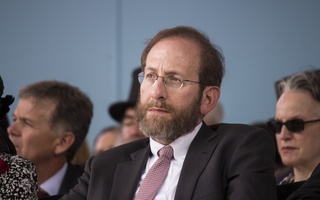{shortcode-939b1cfe722a41e7ccdf18ae55aa1966afeb7b18}Harvard has appealed a National Labor Relations Board decision to invalidate a student unionization election held last fall, the latest step in a unionization process that has lasted months.
In July, NLRB Regional Director John J. Walsh, Jr. ruled that a student unionization election held at Harvard last fall was invalid and called for another vote on the matter. Lawyers representing Harvard Graduate Student Union-United Auto Workers had argued that lists of eligible voters circulated by Harvard before last November’s unionization election were inadequate, so the results of the vote should be deemed invalid and another election should be held.
But Harvard has argued that the election—which showed more students voting against unionization than for it in a contested vote count—is valid, and has filed to let the election stand.
“The University believes strongly that the November 2016 election results, which reflect the votes and voices of the majority of eligible voters, should stand,” Director of Labor and Employee Relations Paul R. Curran wrote in an email to students after Walsh’s ruling. “Harvard will ask the NLRB in Washington, DC, to review the regional director’s decision.”
In its appeal, the University challenged Walsh’s finding that Harvard “seeks to change established Board law” by arguing that the election was valid.
“There are compelling reasons for the Board to reconsider outdated case law regarding voter list compliance,” lawyers representing the University wrote in the appeal.
In an email, Belle Cheves, a graduate student and union supporter, criticized the University’s decision to appeal.
“We are disappointed in Harvard’s decision to appeal,” she wrote. “An integral role of the NLRB is to uphold fair union elections. If voter lists can be compromised, this goes against fair democratic processes for workers across the US—it won’t just prohibit us from having a new election.”
The NLRB in Washington, D.C. that will review Harvard’s appeal is composed of presidential appointees. At the start of President Donald Trump’s term, there were two Democrats, one Republican, and two vacancies on the Board. Since then, Trump has nominated two Republicans, Marvin Kaplan and William Emanuel. The U.S. Senate recently confirmed Kaplan’s nomination, while Emanuel has advanced out of committee and awaits a vote by the whole Senate. If Emanuel is confirmed, Republicans will hold a majority on the NLRB.
Union organizers have argued that Harvard has prolonged the dispute over unionization to wait until Republicans, who might be more likely to favor the University’s position, are confirmed on the NLRB.
“Harvard’s disregard for the adverse impact of an anti-union Trump NLRB ruling tells us how far they are willing to go to prevent us from unionizing,” Cheves wrote.
In his email, Curran wrote that Harvard hoped to resolve its disagreement with unionization organizers soon.
“The University is eager to resolve these issues and confirm the outcome of the November 2016 election,” he wrote.
—Staff writer Caroline S. Engelmayer can be reached at caroline.engelmayer@thecrimson.com. Follow her on Twitter @cengelmayer13.
Read more in University News
Harvard May Quietly Turn to Outside Firms in Presidential SearchRecommended Articles
-
 Harvard Files Appeal to NLRB Recommendation for Union Re-Vote
Harvard Files Appeal to NLRB Recommendation for Union Re-Vote -
 Online Petition Garners Support for Student Union Effort
Online Petition Garners Support for Student Union Effort -
 UC Letter Urges Faust to Drop NLRB Appeal
UC Letter Urges Faust to Drop NLRB Appeal -
 Garber Defends NLRB Appeal in Message to Students
Garber Defends NLRB Appeal in Message to Students -
The Final Word on UnionizationBoth the University and the students aiming to unionize must do everything in their power to make the election a procedurally clean one.













